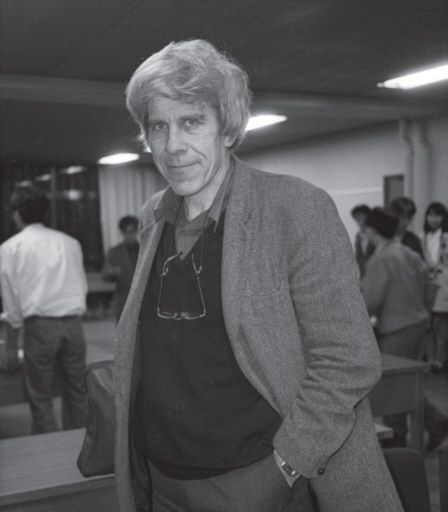
|
Basic Psychology 3‘Human Psychology’Altruism and False Distinctions2006, revised 2019SIMON SHEPPARD |
The famous geneticist J.B.S. Haldane is said to have quipped “I would give up my life for two brothers or eight cousins.” (For some interesting early background to this, see Quote Investigator. It’s a story involving three great scientists.)
Hamilton’s rule
Bystander Apathy (the Bystander Effect) falls into the general theme of altruistic behaviour, and then games such as Tit For Tat need to be considered. Specifically, that cooperative behaviour only evolves when there is a likelihood of future interactions. The base level of interaction is the gene, that behaviour evolves to favour the gene or collection of genes (the genotype). Hamilton’s rule is a formal expression of a natural law, found throughout nature, that altruistic behaviour occurs when
br > c
where b is the benefit, r is the relatedness of the individuals concerned and c is the cost associated with the actions. For example, when a predator approaches a flock of birds feeding on the ground, the first one to see it issues an alarm call. By doing so it draws attention to itself, making itself a likely target. If strict “survival of the fittest” applied, the bird would just take off, maximizing its chance of survival. However, alarm calls are made, because Hamilton’s rule applies. Even if the alarm-caller is killed, benefit will result if enough of its relatives survive.
Hamilton’s rule formalises ‘inclusive fitness.’ This kind of fitness also accounts for the existence of sterile castes in ant colonies. Inclusive fitness takes relatedness into account, so the cost of the soldier or worker ants’ labour is compensated by their kinship to the queen.

The false distinction between ‘psychological’ and ‘biological’ altruism
A dog can be disobedient, and a horse can be observed making a decision. Humans are not unique in being able to defy their instincts. While we can defy our instincts, following them is usually the easiest and happiest course. Not following them takes effort: the supreme will required not to strike at a moment of extreme rage, to not eat, or wilfully ignore other urgent sensations which have evolved to encourage us to engage in just such behaviour. Following instincts is the default state. It can be argued (and I believe it to be so) that the more directly a person follows his instincts, the more psychologically healthy he is.
Recreational drugs, alcohol etc. stimulate, or intensify, or imitate the pleasurable sensations which would otherwise be obtained by natural means. We naturally obtain “highs” from sex, from being the focus of an adoring crowd, or from achieving a novel breakthrough, for example. Individuals taking feel-good drugs are only following a basic pattern, ‘If it feels good, do more.’ The hardship drug-users face in limiting or stopping their habitual drug-taking further illustrates the difficulty we have defying the fundamentally instinctive pattern we follow in behaviour. The more we have to defy our instincts, the greater the burden it becomes. Defying our instincts is like trying not to run while walking down a very steep hill.
While deep-rooted instincts cannot be manipulated, emotions can. Also humans are adept at rationalisation, which can relieve the psychological burden of defying instinct.
Hamilton’s rule strictly applied
The following cannot be regarded as a case of Bystander Apathy, because it was wilful. Also there was little or no neurosis to be counted as a factor. It stands as an example of formalised, exclusive human altruism, an ultra-strict application of Hamilton’s rule. It is ultra-strict because the value assigned to r is zero; r has been made binary.
Prof. Israel Shahak at the beginning of his book Jewish History, Jewish Religion described the incident around 1965 which inspired his subsequent political activity in Israel:
I had personally witnessed an ultra-religious Jew refuse to allow his phone to be used on the Sabbath in order to call an ambulance for a non-Jew who happened to have collapsed in his Jerusalem neighbourhood. Instead of simply publishing the incident in the press, I asked for a meeting with the members of the Rabbinical Court of Jerusalem, which is composed of rabbis nominated by the State of Israel. I asked them whether such behavior was consistent with their interpretation of the Jewish religion. They answered that the Jew in question had behaved correctly, indeed piously, and backed their statement by referring me to a passage in an authoritative compendium of Talmudic laws, written in this century. Israel Shahak, Jewish History, Jewish Religion – The Weight of Three Thousand Years (1994, p. 1).
Big lies in psychology
Richard D. Gross’s Psychology: The Science of Mind and Behaviour claims to be (and was apparently accepted as) a general introduction to psychology. The line is set out in the second edition:
Up to the present time no one has ever been able to relate any aspect of human social behaviour to any particular gene or set of genes, and no one has ever suggested an experimental plan for doing so. Thus, all statements about the genetic basis of human social traits are necessarily purely speculative, no matter how positive they seem to be. Rose, Lewontin and Kamin, Not in our Genes (1984) as quoted in Gross (1992, p. 430).
The original “Big Lie” was by Franz Boas: “There is no such thing as race” and the notion that we are born as a “blank slate.” To claim that Hamilton’s rule is not applicable to humans is absurd, and the magnitude of the whopper is evident by the ease with which its falsity can be demonstrated. Different racial groups show different rates of altruistically donating blood, organs for transplantation etc., but we really need look no further than what happens when someone dies. Then the benefit is the legacy, the cost is naught (could this be a case when the cost is truly zero?!) and the legacy passes to the nearest relatives. The organism maximizes its benefit and minimizes its cost, according to what is good for the genes, even in death. Inheritance according to bloodline has been applied for thousands of years, if not much longer.
It is true that Western peoples behave altruistically to non-relatives, but a decades-long campaign and continuous propaganda has been undertaken to bring this about.

Humans are animals but...
In mainstream psychology “animal psychology” includes humans, a convention which further belies the claim that ‘biological altruism’ and ‘psychological altruism’ are distinct. The term ‘human psychology’ is mildly heretical and its use here is deliberate. The fact is that once human behaviour is largely understood (like any science, a complete unravelling is unlikely), non-human psychology is trivial by comparison. I believe that Procedural Analysis has initiated that understanding.
An alternative name for the Procedural Analysis approach might be Quantum Psychology – as in ‘only as much as required.’ The true goal of science is to simplify, and this is achieved by identifying the dominant variable, mechanism or essential element so that its interactions with other forces can be better understood.